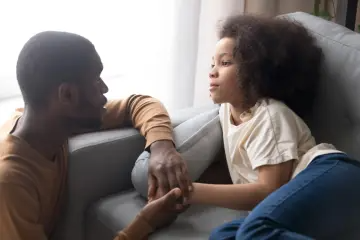Yes, our little ones are sponges that mimic what we say and do. Our positive and negative role modeling can stay with kids for a lifetime. With all the anxiety, loneliness and depression in today’s world, how to talk to your children about mental health can be tricky and revealing.
Watch Your Words And Clarify Your Own Feelings
At other times we are urged to fear someone with mental health issues. Neither fear nor making fun should be part of any conversation with children or teens about mental health.

Take Advantage Of Opportunities
If the family is watching TV or a movie together that features a person living with a mental health illness, use that as an opportunity to ask questions of children. Find out their opinions, what have they heard among their peers, and what do they think? Then listen.
It’s important that they know first that it’s okay to talk about it (and not make fun of someone), and second, there are treatments for those with mental health problems.
It is an illness like any other and not something this person can control or that they wanted.
Many homeless people we see on social media or in our own towns are indeed suffering from some type of mental illness, whether it’s PTSD or schizophrenia. Calling them “bums” or laughing at them should be addressed immediately. Make this an opportunity to have a positive and informative discussion.
Be Open About Family Problems
If someone in the family has a mental health illness, explain to the younger ones how they may act, that they have medications to help, and that sometimes they may not be able to interact with you as you would like.
If one of your teens is depressed and there is fear they may harm themselves, it’s important to attempt a conversation. You don’t necessarily want to confront them, but let them know you are there and willing to listen any time, day or night. Ask if there is anything you can do to help.
If they actually admit they are thinking about hurting themselves, don’t hesitate to get help. Don’t underestimate your child’s admission and think they are just looking for attention. They may be, but you don’t ever want to regret not seeking the support they require.
Above all, fill your home with mental health awareness and education, so your children can correct others and grow up with knowledge to help end stigma.

